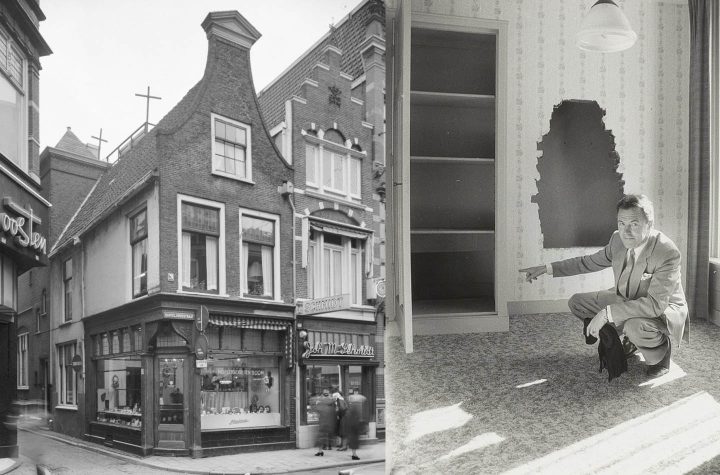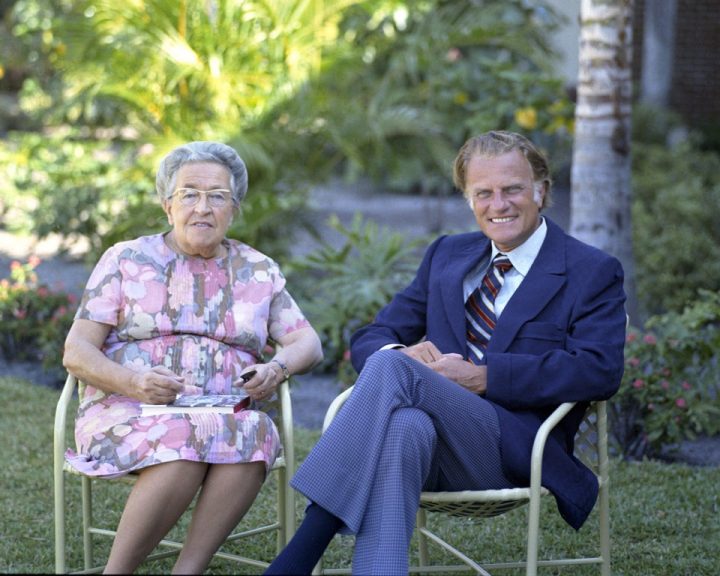I want to tell you about the life of a person who left a positive mark in history through her story of suffering and forgiveness.
Cornelia Arnolda Johanna ten Boom was born on April 15, 1892 in Amsterdam and died on April 15, 1983 in the United States. She was a Holocaust survivor and started a rehabilitation center for concentration camp survivors, as well as a global ministry to preach the power of forgiveness. One of her famous sayings is: “Forgiveness is an act of the will, and the will can function regardless of the temperature of the heart.” She was known as Corrie ten Boom.
She was the youngest of four children, had a brother called Willem and two sisters, Nollie and Betsie. Her brother Hendrick Jan died in infancy. Corrie’s grandfather, Willem ten Boom, opened a watchmaker’s store in Haarlem in the Netherlands in 1837. In 1844 he started a weekly prayer service to pray for the Jewish people suffering persecution in Europe. When Willem’s son Casper inherited the business, he continued the tradition.
Corrie’s mother, Cornelia, died in 1921. The family lived on the second floor above the watch store. Corrie became a watchmaker’s apprentice and in 1922 was appointed the first woman to be licensed as a watchmaker in the Netherlands. Over the years, her family took care of many orphaned and refugee children. Corrie taught Bible classes in Sunday school, and was active in organizing Christian clubs for Dutch children.
During the Second World War, in May 1940, tanks and soldiers invaded the Netherlands. Corrie was 48 at the time, and determined to help her fellow man. So she turned her house into a safe haven for people trying to escape the Nazis. Members of the Dutch Resistance brought watches to the family store, and hidden inside large watch boxes were bricks and mortar that were used to build a false wall and a hidden room in Corrie’s bedroom.
Even though it was cramped, this hiding place could accommodate six or seven people, Jews or members of the Dutch underground. Corrie and her family installed a warning bell to signal their guests to hide whenever the Gestapo, the Nazi secret police, were searching the neighborhood. The hiding place worked well for almost four years, because people were constantly coming and going in the busy watch repair shop.

But on February 28, 1944, an informant treacherously reported to the Gestapo about the assistance that Corrie’s family was offering. Thirty people, including several of her family, were arrested. However, the Nazis were unable to find the six people hiding in the secret room. They were rescued two days later by the Dutch Resistance Movement. Corrie’s father, Casper, then 84, was taken to Scheveningen prison and died there 10 days later.
Corrie’s brother Willem, a retired Dutch minister, was released thanks to a sympathetic judge. Corrie’s sister was also released. Over the next 10 months, Corrie and her sister Betsie were transported from Scheveningen to the Vught concentration camp in the Netherlands, finally ending up in the Ravensbrück concentration camp near Berlin, the largest camp for women in German-controlled territories.
The prisoners were used for forced labor in agricultural projects and armaments factories. Thousands of women were executed there. The living conditions were brutal, with meager rations and severe discipline. Even so, Betsie and Corrie held a secret prayer service in the concentration camp, using a smuggled Dutch Bible.
The women prayed and sang hymns softly to avoid the attention of the guards. On December 16, 1944, Corrie’s sister Betsie died in Ravensbrück from starvation and lack of medical care. Corrie later recounted that her sister’s last words were: “We must tell people what we have learned here. We must tell them that there is no pit so deep that He is not deeper still. They will listen to us, Corrie, because we have been there.”
Administrative Error Miracle
Two weeks after Betsie’s death, Corrie and others were released from the camp due to allegations of an administrative error. She often called this occurrence a miracle. Shortly after her release, all the other women in her age group in Ravensbrück were executed. Corrie traveled back to Groningen in the Netherlands, where she recuperated in a convalescent home.
A truck took her to her brother Willem’s house in Rijnsburg, and he arranged for her to go to the family home in Haarlem. In May 1945, she rented a house in Bloemendaal, which became a home for concentration camp survivors, fellow wartime resistance workers and disabled people.
She also set up a non-profit organization in Holland to support the home and its ministry. In 1946, Corrie boarded a cargo ship for the United States. Once there, she began speaking at Bible classes, churches and Christian conferences. Throughout 1947, she spoke extensively in Europe and became affiliated with the “Youth for Christ” group.
It was at a Youth for Christ world congress in 1948 that she met Billy Graham and Cliff Barrows. Graham would later play an important role in making her known worldwide. From the 1950s to the 1970s, Corrie ten Boom traveled to 64 countries, speaking and preaching about Jesus Christ. Her 1971 book, “The Hiding Place”, became a bestseller.

In 1975, a film branch of the Billy Graham Evangelistic Association released a movie version with Jeanette Clift George in the role of Corrie. Queen Juliana of the Netherlands made Corrie a knight in 1962. In 1968 she was invited to plant a tree in the Garden of the Righteous Among the Nations at the Holocaust Memorial in Israel.
Gordon College in the United States awarded her an honorary doctorate in humane letters in 1976. As her health deteriorated, Corrie settled in Placentia, California. In 1977 she was granted a resident alien card, but limited her travels following pacemaker surgery. The following year, she suffered the first of several strokes, which reduced her ability to speak and move around on her own.
Corrie ten Boom died at the age of 91 on April 15, 1983. She was buried in Santa Ana, California. From the moment she was released from Ravensbrück until her illness ended her ministry, Corrie ten Boom reached millions of people around the world with the Gospel message. Her book “The Hiding Place” continues to be a popular and impactful book, and her 10 teachings on forgiveness continue to resonate.
Corrie’s family home in Holland is now a museum dedicated to remembering the Holocaust. More than 800 people found temporary shelter in the home of this daughter of God. The Christian faith played a very important role in her life. At home, she read the Bible every day, sang many hymns and talked about Jesus. Their love for God and for the Jewish people was the reason why they risked their lives to save the lives of others.
Concentration Camp Guard
There is a saying of Jesus about forgiveness that she knew by heart, which is very interesting. She knew the song by heart. After the war, Corrie traveled the world with her message of forgiveness, except to Germany. She didn’t want to go there, but then she was put to the test herself. Because talking about forgiveness is easier than forgiving yourself. She received an invitation to speak at a church in Munich, Germany, and she went. In that small church in Germany, the concentration camp guard stood in front of Corrie. She recognized him, but he didn’t even remember her. He said to her: “I became a Christian after the war. Your message about forgiveness really touched me. You spoke about the Ravensbrück concentration camp. I was a guard there. I always wanted to ask someone for forgiveness in person. So I ask you: will you forgive me?”
Forgiveness Is Not an Emotion
Some time after this episode, Corrie said: “It felt like my blood was suddenly freezing. There was a man standing in front of me, co-responsible for the slow and horrible death of my dear Betsie, and he dares to ask me for forgiveness. All those beautiful sermons about forgiveness! But now I have to forgive myself, and I can’t.” The man held out his hand to Corrie, but she didn’t take it. She said quickly: “I prayed softly to Jesus: ‘I don’t want this. You have to help me. And then I understood,” she said. “Forgiveness is not an emotion, it’s an act of the will. The emotion isn’t there, but I can move my hand almost mechanically. I put my hand in his, and then something extraordinary happens. Suddenly, I felt a warm wave through my body, from my shoulder, through my arm, to my hands, our hands, mine and his. I had to cry.” And she said: “I forgive you, brother, with all my heart.” There we were, the concentration camp guard and the prisoner. For a long time, we held hands, and never before had I experienced God’s love so deeply.
But Corrie is also honest: forgiving is still difficult. Forgiveness is not a moment, but often a choice you make in various circumstances. We may have to forgive several times. And she says that we need to do this not only in war situations, but also when friends hurt us. She also shares the example of the bell, which she once heard from a priest. And she explains it this way: “Imagine a tower where there is a clock. When someone hurts you, you hear the bell go ‘ding dong, ding dong’, and we often keep pulling the rope for a long time, so we keep hearing the bell. Only when we let go of the rope will the bell stop. But it’s also true that when we let go of the rope, the bell doesn’t stop immediately. It will keep ringing for a while, until we hear the last ‘dong.’ It’s the same with forgiveness. As long as we keep pulling the rope, the pain will remain palpable. When we forgive, we must let go. That doesn’t mean the pain is over, but it will calm down at some point.”
Call to Action: Ask Jesus to Help You Forgive Others
I’ll end with a quote from Corrie, who said: “You can never learn that Christ is all you need, until Christ is all you have.” Forgiveness is not free; it has a price and it can be expensive. Jesus paid the price of His life for love of you and me. Let’s ask Him to give us the ability to forgive people who have hurt us and perhaps continue to hurt us. This is a miracle that He, Jesus, is willing to perform in our lives. Forgive yourself and forgive others.

The above was originally published at Abundant Health.



